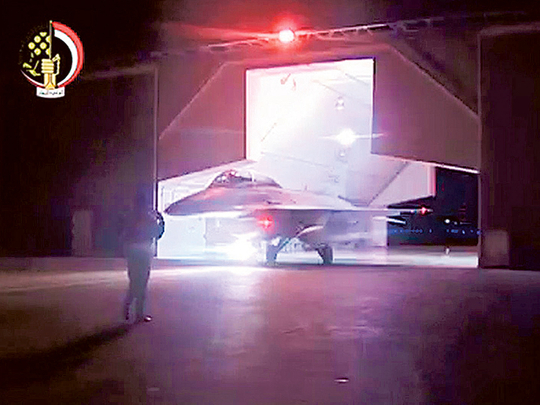
Cairo: Egypt’s prompt air strikes against militants in neighbouring Libya raise the stakes for Cairo’s declared war on terrorism, taking it beyond national borders, according to experts.
Egypt said Monday its warplanes had carried out “precise” strikes against training camps and arms depots of extremists loyal to the radical Daesh, few hours after the release of a video showing the decapitation of 21 Egyptian Christians abducted in Libya more than a month ago.
“The Egyptian strikes are expected to continue in the coming days,” said Mamdouh Abdul Halim, a military expert. “These strikes may draw another criminal act from Daesh, but the Egyptian army is strong and prepared to strike hard again,” he told Gulf News.
The Egyptian army said in a statement that Monday’s aerial attack was in retaliation for the killing of the Egyptians captured in Libya. “Let those far and near know that Egypt has a shield protecting the country’s security,” the military statement said as state television broadcast a video showing fighter jets leaving their bases for the bombing mission.
“The terrorists in Libya share the bloody ideology embraced by the militants in Sinai. Therefore, the military move in Libya is part of the campaign to root out terrorism that threatens Egyptian national security and the whole region,” said Abdul Halim.
Egyptian security troops have been the target of deadly assaults, mainly in the restive Sinai Peninsula, since the army’s 2013 ouster of president Mohammad Musi of the Muslim Brotherhood. Most of the attacks have been claimed by Ansar Bait Al Maqdis, a Sinai-based radical group that has recently sworn allegiance to Daesh.
In a televised address shortly after the beheadings video emerged, Egyptian President Abdul Fattah Al Sissi vowed retaliation and ordered a ban on Egyptians’ travel to Libya where there is already a large Egyptian community.
“The anger sparked by the execution of the 21 Egyptians has unified the nation behind its leadership and made it easy for it to take the decision to retaliate quickly,” Abdul Halim said.”Now it is necessary for Egyptians to abide by the ban on travelling to Libya.”
The military action in Libya drew praise from Egyptian politicians.
“Our planes’ pounding of our brothers’ killers in Libya was a fair retribution for their blood,” Hamdeen Sabahy, Al Sissi’s sole rival in last year’s presidential election, said in a tweet. Other politicians commended the strikes as a “restoration of national dignity.”
The Egyptian army did not say exactly where the strikes took place.
Chief of the Libyan air force, Saqr Al Jurushi, told private Egyptian TV Al Nahar that the bombardment targeted the eastern city of Derna, a stronghold of militants, and had been coordinated with the Libyan side.
“The operation will continue,” Al Jurushi said.
Hours after the news of the Egyptian air strikes was broken, Al Sissi, who is a Muslim, went to the Coptic Church’s main cathedral in Cairo to offer condolences over the Copts’ executions.
“The brutal beheadings put Al Sissi to one of the hardest tests he has faced since becoming president [in June],” said Salah Al Hadi, a political expert.
“The decision to strike against Daesh terrorists in Libya has obviously boosted the Egyptians’ morale and came quicker than many had expected. But it involves risks in light of the fact that there are thousands of Egyptians still in Libya,”Al Hadi said. “Militant groups there are likely to try to take some of these Egyptians as hostages. The military move will further implicate Egypt in the chaotic situation in Libya.”
Libya has two rival governments and parliaments, each backed by competitive militias. Egypt has repeatedly announced its backing for the internationally recognized government based in the eastern town of Tobruk.
Last year, media reports claimed that Egypt had carried out air strikes against hardline Islamists in Libya, an allegation denied by Al Sissi at the time.
Egypt shares a border of more than 1,000 kilometres with oil-rich Libya. The porous border has reportedly been used for an illegal flow of arms into Egypt in recent years.












